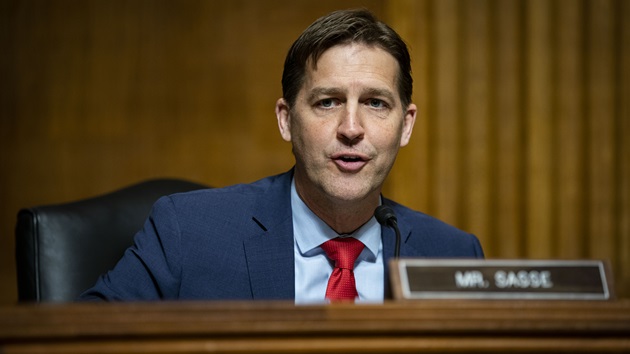Trump and Senate Republicans still divided on how to implement his agenda
Written by ABC Audio ALL RIGHTS RESERVED on January 9, 2025
(WASHINGTON) — After meeting with Senate Republicans on Capitol Hill Wednesday, President-elect Donald Trump appeared ambivalent about the debate over whether to craft two legislative attempts to reshape fiscal policy for his agenda or settle on one sweeping package in an “all-in” approach.
Trump told reporters that he had “a great meeting” with the senators, although it appeared that the closed-door meeting that lasted more than 90 minutes did not lock down an agreement on how to proceed.
“There’s great unity,” Trump said. “I think there’s a lot of talk about two [bills], and there’s a lot of talk about one, but it doesn’t matter. The end result is the same. We’re going to get something done that’s going to be reducing taxes and creating a lot of jobs and all of the other things that you know about.”
Despite Trump’s comments, senators in the room heard Trump loud and clear: His preference, though he’s open to alternative ideas, is one “big, beautiful bill” to deal with many of his legislative priorities in a single swoop.
But just because senators heard him doesn’t mean they agree with him.
There was hope going into tonight’s meeting with Trump, the Senate’s first since he won the presidential race in November, that it could bring the Senate, which has largely favored a two-bill approach, and the House, where Speaker Mike Johnson prefers a one-bill approach, into one line of thinking on the matter.
Senators leaving the room Wednesday night seemed unmoved.
“It’s no mystery we’re advocating for two,” Sen. Dan Sullivan, R-Alaska, said as he departed.
There were a number of senators, including Trump allies like Sen. Lindsey Graham, R-S.C., and Sen. Ted Cruz, R-Texas, who forcefully made the case for a two-bill solution while in the room with Trump. Cruz and his allies want one bill to address border security, military spending and energy. A second bill addressing tax policy could come later, they said.
With little to no support expected from Democrats, Republicans plan to push forward through “reconciliation” — a fast-track process limited to spending and revenue legislation that needs only a majority rather than the 60-vote threshold in the Senate needed to pass legislation.
While the debate might seem in the weeds, it could have serious implications for Trump’s agenda. Bills passed through reconciliation give Republicans more wiggle room to pass certain measures that Democrats oppose. But these bills are cumbersome, bound by a number of rules about what may and may not be included, and will require the near-unanimous support of Republicans.
Senate Republicans continue to break with Trump and Johnson on the issue because they believe they can notch a win early in Trump’s presidency by breaking the package into two chunks.
“I expressed vigorously, as did numerous other people that the best path to success is winning two major victories rather than putting all the eggs in one basket and risking — a very real risk — of it not getting the votes to pass,” Cruz said. “I strongly believe the path that makes sense is to take up two bills. Why? Because that unifies Republicans. We can get that passed. We could have a major victory early on, and then to move to extending the tax cuts.”
Cruz said there was “complete consensus” among the senators on a two-part solution. “Not a single senator disagreed.”
Sen. Shelley Moore Capito, R-W. Va., who told reporters she served as the moderator for the meeting, said Trump was listening intently to their suggestions but she believes two bills provide the most viable path to victory.
“The two-bill approach that [Senate Majority Leader John] Thune had liked, I think is generally the direction the Senate has been wanting to go to get that quick victory,” Capito said. “I think there’s a lot of discussion that’s going to go on. What can the House pass? What does the Speaker think? So he [Trump] heard from us and from our leader that a two-bill strategy is very much alive over here and something we’re still very interested in. So no decisions were made.”.
Capito seemed uncertain if there would be cohesion with Trump moving forward.
“I don’t know — we’ll see,” she said, adding, “I think, you know, the leaders will get together with the president and they’ll make those decisions.”
Republican Whip John Barrasso will be a key part of rounding up votes for whatever package is ultimately advanced and he also sees two bills as the right direction to go.
“We think there’s a lot of advantages to get an early win and to focus immediately on the border, on energy and on the strong military,” Barrasso said.
Barrasso said he was there when the Senate used this same fast-track budget tool to implement the Trump tax cuts in 2017. That took time, he said.
“There’s a lot of detail to be done with that, and so that’s going to take awhile” he said. “I think we can much more quickly deal with the border, energy, and military funding.”
Still, Trump continues to prefer the one-bill approach backed by Johnson, senators said.
“I think he’s still open to whatever can work. I think there seems to be movement from the House to do one, and so I think that’s the way he leans,” Sen. Rand Paul, R-Ky., said.
Another option that was floated was holding a “horse race” which would see the House originating a sweeping proposal that includes tax policy as its base while the Senate originates a more narrowly tailored bill that just includes border and energy reform then see which package gains more momentum.
“I said, ‘Well, Mister President, you love a horse race, why don’t you set it up as a horse race? And then whatever works best is great,'” said Sen. John Hoeven, R-N.D. “HIs preference is one bill, but I think he’s open to it.”
Trump reiterated his preference for one bill when he spoke to reporters on Tuesday, but said he could live with two.
“Well, I like one big, beautiful bill, and I always have, I always will, he said. But if two is more certain [to pass], it does go a little bit quicker because you can do the immigration stuff early,” he said.
Johnson said he hopes to have a bill ready by the first week in April, but it remains to be seen if he can get fiscal conservatives in his conference, who have long opposed all-in-one bills like the one Johnson is proposing, on board.
The speaker pushed back on Wednesday about the one-bill approach being a kitchen sink approach.
“This is not an omnibus spending bill, but appropriation,” Johnson said. “This is reducing spending, which is an objective we talked about. I’ll keep reiterating this: that just because the debt limit is raised, to give stability the bond markets and to send a message around the world that we will pay the nation’s debt. We are doggedly determined to decrease the size of scope of government and to limit spending, cut spending so you can you’ll see both of those things happen simultaneously.”
Johnson also intends to handle the debt limit in the reconciliation bill — without Democratic support.
“That way, as the Republican Party, the party in charge of both chambers, we again get to determine the details of that. If it runs through the regular order, regular process… then you have to have both parties negotiating. And we feel like we are in better stead to do it ourselves,” he said Tuesday.
But it remains to be seen whether Johnson can sell the fiscal conservatives in his conference on that idea. They nearly derailed the short-term government funding bill to avert a shutdown last month after Trump demanded that it dealt with the debt ceiling.
Trump will meet with groups of House Republicans at his Mar-a-Lago club in Florida this weekend.
“He’s bringing in big groups of House Republicans to Mar-a-Lago over the weekend three days in a row to meet with and talk with all of our team members about what’s ahead of us and the challenges and how we can accomplish all this together,” Johnson said, though the speaker is not expected to attend.
Copyright © 2025, ABC Audio. All rights reserved.







